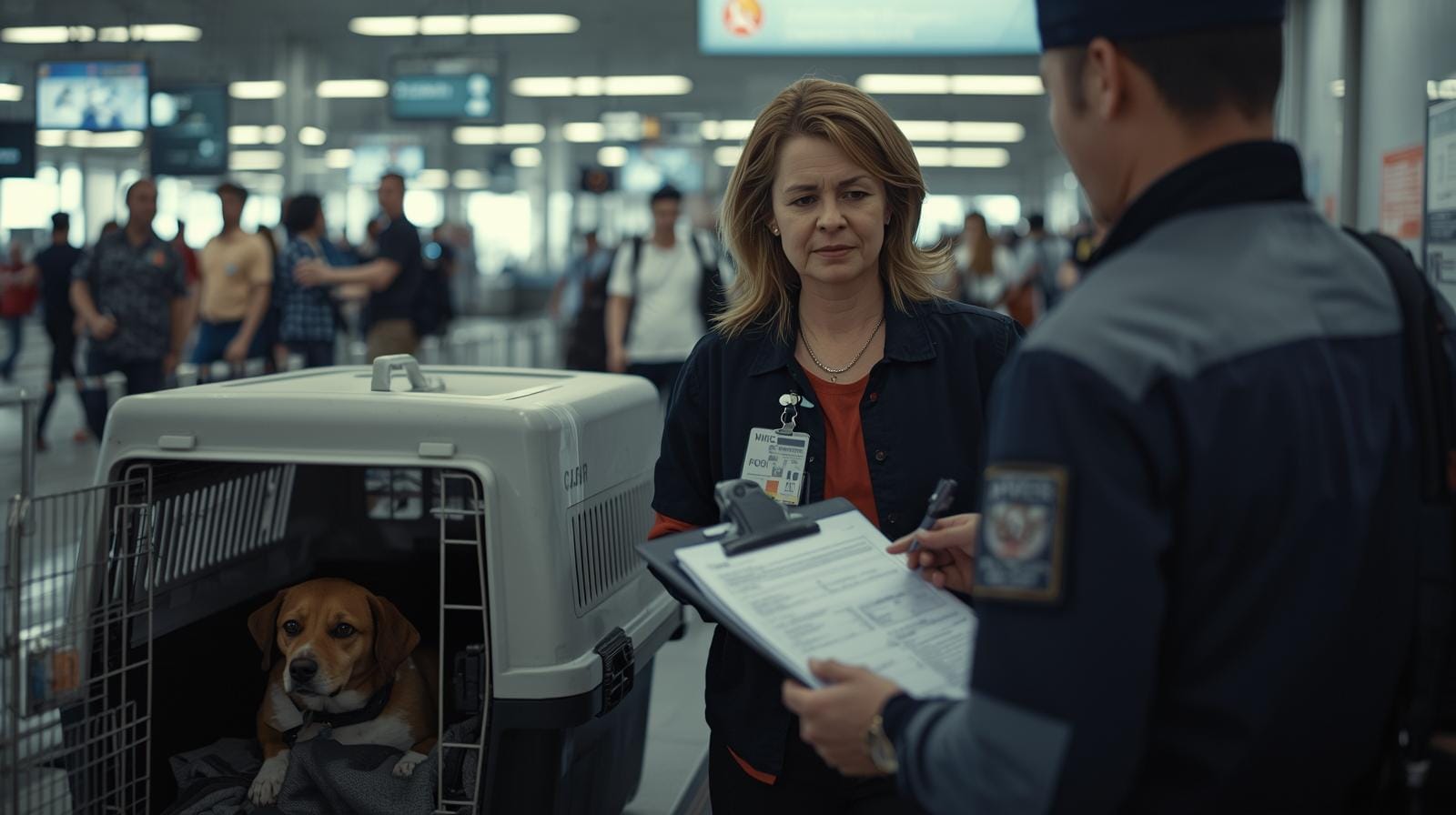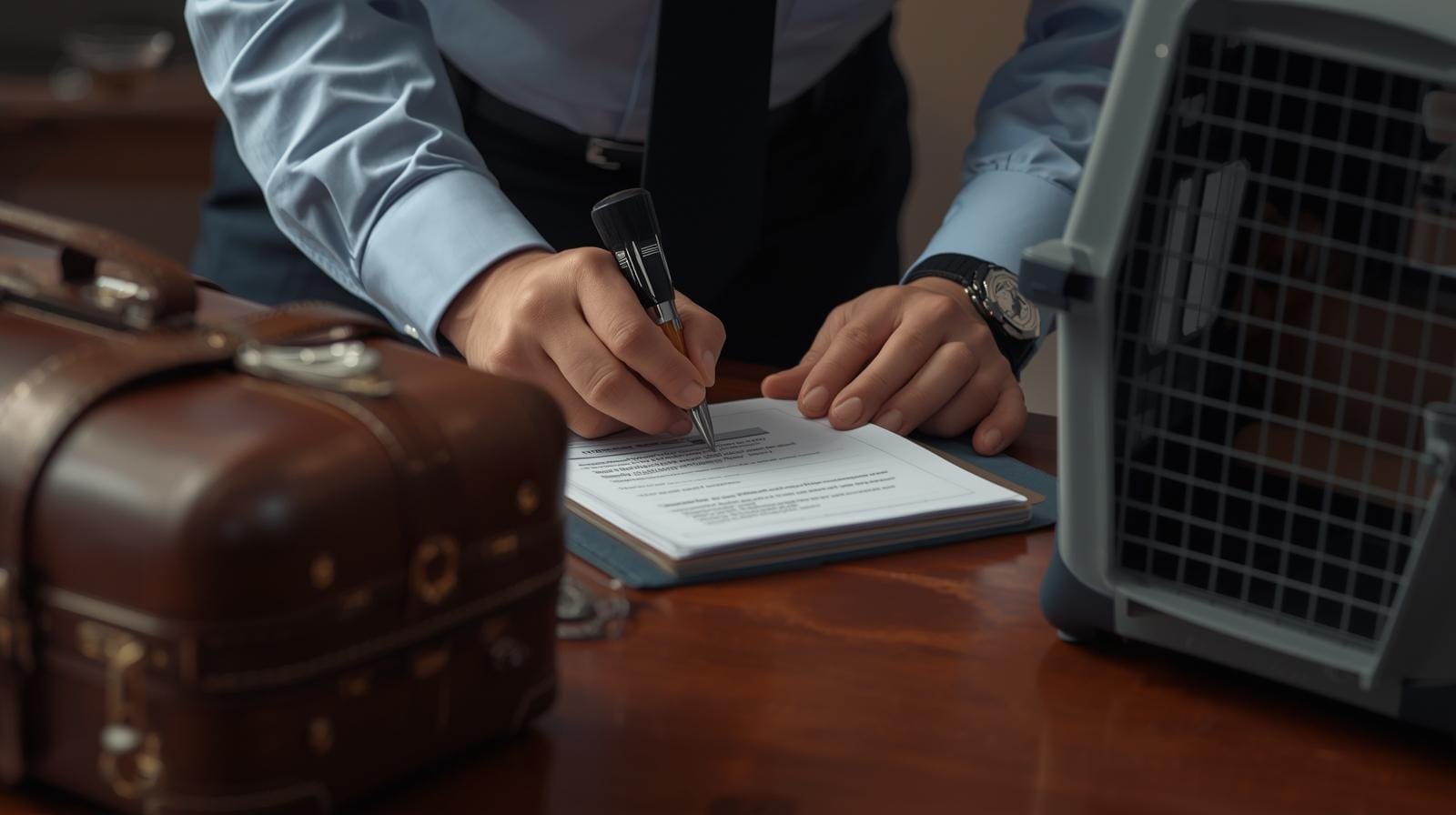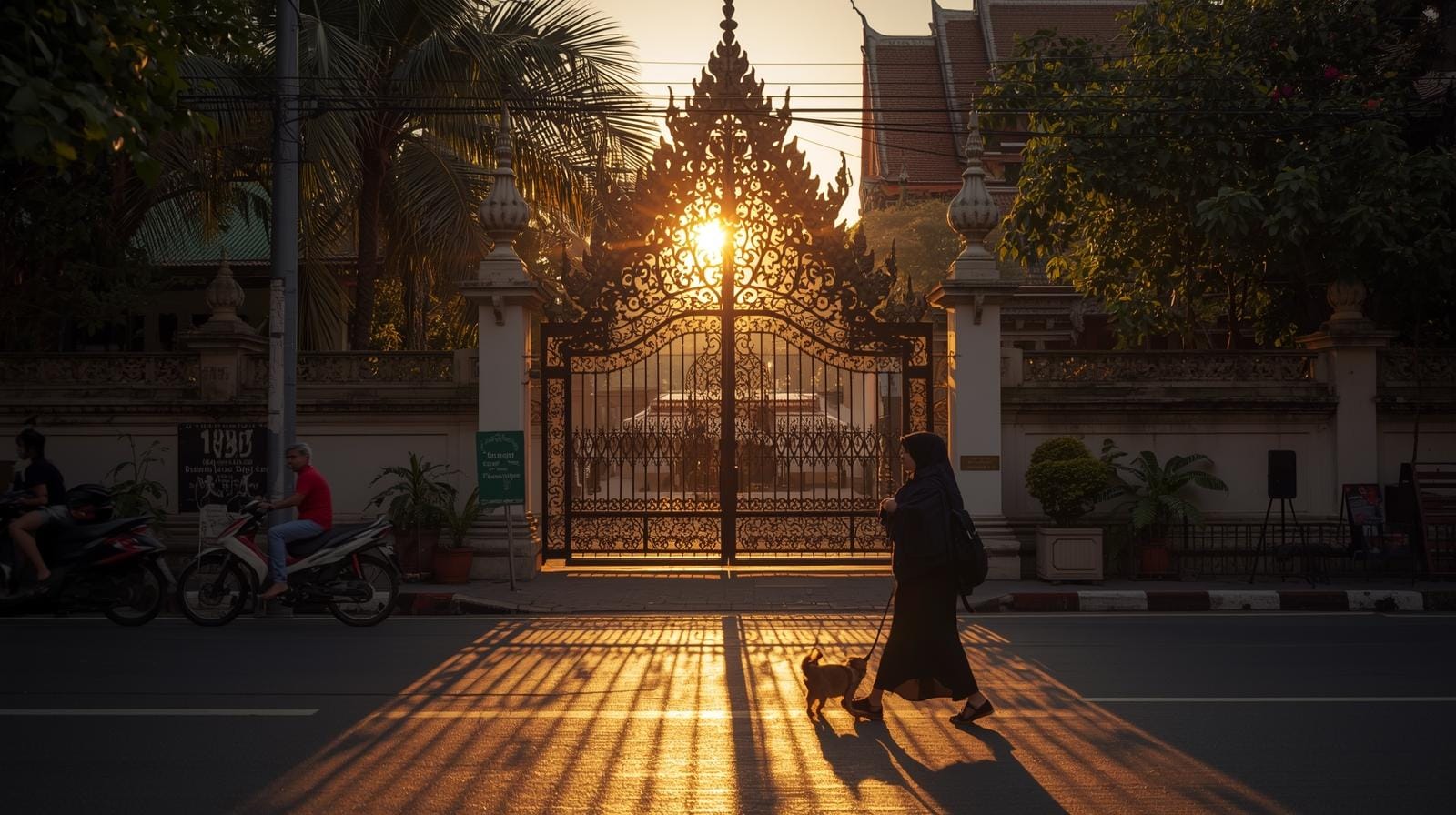A New Dawn in Thailand
Lucy had dreamt of Thailand’s warm mornings for months. Back in London, she and Max – her loyal Labrador – prepared for a life change. On the morning of their departure, Lucy zipped Max into his padded travel carrier, her heart pounding with excitement and nerves. She thought of crowded city parks left behind, of Max chasing pigeons in Hyde Park. Now the sound of Thai canals and temple bells awaited. As the plane climbed into the cloudy English sky, Lucy squeezed Max’s paw. “We’re really doing this,” she whispered, smiling through anxious tears. The humidity and soft light of dawn welcomed them as the aircraft touched down at Suvarnabhumi. Lucy unbuckled Max’s leash and stepped onto the tarmac. For the first time in weeks, the escape room of her old life gave way to a new adventure.

Stepping into the airport, Lucy felt the reality sink in. Max sniffed the fragrant, warm air, tail wagging at this strange new world. Together they queued at immigration: Lucy glanced at her stamped passport and the non-immigrant visa that would start their life here. Overseas signage replaced English familiarities. Through the sliding doors, she caught the first view of the city’s skyline – a mix of modern towers and temple spires. Behind them, the British chill melted into tropical warmth. Lucy exhaled with relief; every logistical hurdle was now behind her. In that moment, she knew that the challenges ahead – new language, new culture, new home – were surmountable, as long as they were together.
“We did it, Max,” Lucy said with a grin. “Thailand, at last.”

Navigating the Pet Import Process
Long before the flight, Lucy learned she needed official clearance for Max. She applied for an import permit via Thailand’s Animal Quarantine Station (AQS) at least seven business days before departure. In one e-mail she sent the required R.1/1 form (Department of Livestock Development application), along with her passport copy, Max’s clear headshot, their flight itinerary, Max’s vaccination record, and his microchip certificate. Because the UK is rabies-free, Thailand doesn’t insist on a rabies antibody test, but an ISO microchip (AVID accepted) and proof of core vaccines are mandatory. Max had received inoculations for canine distemper, hepatitis, parvovirus, leptospirosis, and rabies at least 21 days before the flight, meeting the 21-day rule. Once approved, the AQS emailed Lucy a 60-day import permit. Confident everything was in order, Lucy booked their tickets and scheduled Max’s “pet passport” visits with the vet – making sure every detail was in English on official forms.

Looking for pet-friendly housing in Thailand?
We connect readers with verified agents who specialise in condos, houses, and serviced apartments that accept dogs and cats — with clear rules and no surprises.
Readers frequently use our network to secure pet-friendly condos and homes across Thailand.
On arrival in Bangkok, the final checks were quick. Lucy presented Max’s endorsed International Health Certificate and the Thai import permit to AQS officers at the airport. The vet inspector reviewed the records and performed a cursory check to confirm Max showed no illness. Because Max was healthy and the paperwork was perfect, they skipped quarantine. The officer issued an official Import Approval (Form R-6) and Import License (Form R-7), allowing Max to stay indefinitely with Lucy. She paid the 500 THB pet entry fee in cash, collected Max’s stamped papers, and led him out of the sterile customs corridor. Weary but elated, Lucy realized the hardest part was done – Max was officially home, too.
“Max, welcome to Thailand,” Lucy breathed as she rolled up Max’s crate after the vet’s check.

Settling into Thai Life
Now that they were settled into their city, Lucy turned to finding a long-term home. Bangkok’s housing market was surprisingly tight – new condo launches hit a 15-year low, and demand for space (especially among retirees and work-from-home travelers) was high. Using a property portal helped Lucy hunt for listings quickly. Eventually, she found a spacious apartment on the city’s outskirts with a small garden for Max. Many newer high-rises prohibit pets, so expats like Lucy often look for ground-floor units or older townhouses. In her search she discovered that resorts and rentals are booming too – for example, former Bangkok homes are being converted into guesthouses for long-stay guests. Lucy chose a quiet soi (side street) near Lumpini Park, grateful Max could run off-leash on the weekend. Each new found detail – the condo’s pet-deposit policy and Max’s approved crate dimensions – reminded her of the importance of planning before moving.

Looking for pet-friendly housing in Thailand?
We connect readers with verified agents who specialise in condos, houses, and serviced apartments that accept dogs and cats — with clear rules and no surprises.
Readers frequently use our network to secure pet-friendly condos and homes across Thailand.
In Thailand, Lucy discovered a surprisingly warm pet culture. Most locals treated animals with kindness – neighbors were already familiar faces walking big dogs like Max and small street cats. As one expat guide notes, Thailand is “a pet-friendly country” where many condo buildings happily welcome animals. She started frequenting pet cafés and local vet clinics, and even met a “dogs of Bangkok” Facebook group. Every morning, Max strolled with Lucy through a small Buddhist shrine where elderly residents left offerings for the street dogs. Even stray cats in her neighborhood had regular feeding stations. Lucy smiled at how quickly the community embraced them: within a few weeks, Max already knew the names of the friendly Tuk-Tuk driver and the coffee vendor, both of whom offered him treats. Thais’ easygoing kindness and communal spirit made settling in much smoother than she’d feared.
“Here, it seems everyone has a soft spot for our four-legged friends,” Lucy laughed, watching Max happily greet a Thai pup at the dog-friendly Lumpini Park.

Reflections and Advice
Months in, Lucy often reflects on their journey. She knows she couldn’t have done it without good planning and community support. One practical lesson was getting a proper visa: Thailand recently consolidated its visa categories, but banks now demand a genuine long-term permit. Lucy chose a Non-Immigrant O (retirement) visa and ensured her paperwork was in order before moving. She also recommends new arrivals engage a trusted visa partner or consultancy – experts can smooth the path through Thailand’s paperwork labyrinth. When it came to travel, Lucy relied on expat guides for convenience: she booked their flights and hotel through Expedia’s bundled deals, searched Lazudi for pet-friendly housing options, and grabbed a Breeze eSIM to stay connected nationwide from Bangkok to Chiang Mai. Back home, pet services are well-developed: she found English-speaking vets, pet sitters, and even Thai obedience classes for Max. Joining local groups (like the Bangkok Expat Dog Meetup) helped her and Max make friends, turning strangers into a support network. Through it all, The Thailand Advisor was her north star – blending heartfelt stories with solid data, just as it has for many in the expat community.
If Lucy had any advice, it’s simple: don’t go it alone. Get the right information and make friends along the way. With proper planning – health certificates ready, import permit filed, and a visa sorted – moving here can be smoother than you imagine. Each small step made her more confident: learning a few Thai phrases to chat with vets, scanning the latest pet import guidelines online, and embracing Thai customs with an open heart. Today, she often catches herself smiling at how much their lives changed. Thailand’s sunrise may be brighter, but what truly shines is the warmth of a new home and community.
“If I can do it, anyone can,” Lucy reflects. “Thailand has become home for Max and me.”

Looking for pet-friendly housing in Thailand?
We connect readers with verified agents who specialise in condos, houses, and serviced apartments that accept dogs and cats — with clear rules and no surprises.
Readers frequently use our network to secure pet-friendly condos and homes across Thailand.
Read next: Thailand’s Visa Overhaul 2025: 17 Categories Down to 7 — What Really Changes for Expats.










